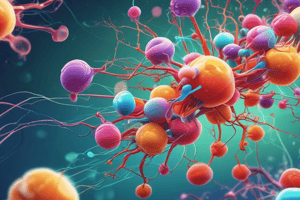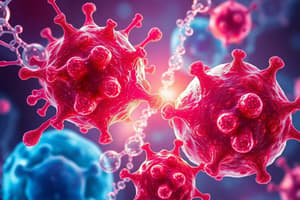Podcast
Questions and Answers
Which repair systems are light-independent?
Which repair systems are light-independent?
- Base and nucleotide excision repair (correct)
- Photoreactivation repair
- Mismatch repair
- Transcription-coupled repair
Which repair systems are light-independent?
Which repair systems are light-independent?
- Base and nucleotide excision repair (correct)
- Mismatch repair
- Transcription-coupled repair
- Photoreactivation repair
How many typical amino acids are found in proteins?
How many typical amino acids are found in proteins?
- 10
- 15
- 20 (correct)
- 25
How many typical amino acids are found in proteins?
How many typical amino acids are found in proteins?
What is the generalized structure of a carbohydrate?
What is the generalized structure of a carbohydrate?
What is the generalized structure of a carbohydrate?
What is the generalized structure of a carbohydrate?
What is the general term for a large molecule made up of many similar subunits?
What is the general term for a large molecule made up of many similar subunits?
What is the general term for a large molecule made up of many similar subunits?
What is the general term for a large molecule made up of many similar subunits?
What does the fibrous lamina do?
What does the fibrous lamina do?
What does the fibrous lamina help to stabilize?
What does the fibrous lamina help to stabilize?
What is the secondary level of protein organization due to?
What is the secondary level of protein organization due to?
What is the secondary level of protein organization due to?
What is the secondary level of protein organization due to?
What are some characteristics of proteins?
What are some characteristics of proteins?
What are some characteristics of proteins?
What are some characteristics of proteins?
What happens to a protein when it is boiled?
What happens to a protein when it is boiled?
What happens to a protein when it is boiled?
What happens to a protein when it is boiled?
What do lysosomes not do?
What do lysosomes not do?
What do lysosomes not break down to make ATP?
What do lysosomes not break down to make ATP?
What do proteins embedded in the cell membrane not do?
What do proteins embedded in the cell membrane not do?
What do proteins embedded in the cell membrane not produce for the cell?
What do proteins embedded in the cell membrane not produce for the cell?
Which brain structure is responsible for the regulation of sleep and wakefulness?
Which brain structure is responsible for the regulation of sleep and wakefulness?
What part of the brain is responsible for relaying sensory information to the cerebral cortex?
What part of the brain is responsible for relaying sensory information to the cerebral cortex?
Which nerve innervates the medial side of the thigh?
Which nerve innervates the medial side of the thigh?
What part of the brain is involved in voluntary motor control, coordination, and balance?
What part of the brain is involved in voluntary motor control, coordination, and balance?
Which nerve innervates the skin on the anterior thigh, medial side of the leg, and medial side of the ankle?
Which nerve innervates the skin on the anterior thigh, medial side of the leg, and medial side of the ankle?
What is the fluid-filled cavity within the brain that helps cushion and protect it?
What is the fluid-filled cavity within the brain that helps cushion and protect it?
Flashcards
What are two light-independent DNA repair systems?
What are two light-independent DNA repair systems?
Base excision repair and nucleotide excision repair are two types of DNA repair that don't require light.
How many amino acids are commonly found in proteins?
How many amino acids are commonly found in proteins?
Proteins are made up of 20 different amino acids.
What is the generalized structure of a carbohydrate?
What is the generalized structure of a carbohydrate?
The general structure of a carbohydrate can be represented as (CH2O)n, where n is the number of carbon atoms.
What is the general term for a large molecule made up of many similar subunits?
What is the general term for a large molecule made up of many similar subunits?
Signup and view all the flashcards
What does the fibrous lamina do?
What does the fibrous lamina do?
Signup and view all the flashcards
What determines the secondary structure of a protein?
What determines the secondary structure of a protein?
Signup and view all the flashcards
What are some characteristics of proteins?
What are some characteristics of proteins?
Signup and view all the flashcards
What happens to a protein when it is boiled?
What happens to a protein when it is boiled?
Signup and view all the flashcards
What don't lysosomes do?
What don't lysosomes do?
Signup and view all the flashcards
What do proteins embedded in the cell membrane not do?
What do proteins embedded in the cell membrane not do?
Signup and view all the flashcards
What brain structure regulates sleep and wakefulness?
What brain structure regulates sleep and wakefulness?
Signup and view all the flashcards
What part of the brain relays sensory information to the cerebral cortex?
What part of the brain relays sensory information to the cerebral cortex?
Signup and view all the flashcards
Which nerve innervates the medial side of the thigh?
Which nerve innervates the medial side of the thigh?
Signup and view all the flashcards
What part of the brain is involved in voluntary motor control, coordination, and balance?
What part of the brain is involved in voluntary motor control, coordination, and balance?
Signup and view all the flashcards
Which nerve innervates the skin on the anterior thigh, medial side of the leg, and medial side of the ankle?
Which nerve innervates the skin on the anterior thigh, medial side of the leg, and medial side of the ankle?
Signup and view all the flashcards
What is the fluid-filled cavity within the brain that helps cushion and protect it?
What is the fluid-filled cavity within the brain that helps cushion and protect it?
Signup and view all the flashcards
Study Notes
- Base & nucleotide excision repair are light-independent repair systems.
- There are 20 typical amino acids found in proteins.
- The generalized structure of a carbohydrate is (CH2O)n.
- The general term for a large molecule made up of many similar subunits is a polymer.
- The fibrous lamina helps to stabilize the nuclear envelope.
- Secondary level of protein organization is due to interactions between amino acid side chain groups.
- Proteins have various characteristics such as enzymatic activity, structural support, and transport functions.
- When a protein is boiled, it loses all levels of organization besides primary.
- Lysosomes do not break down carbon-containing molecules to make ATP.
- Proteins embedded in the cell membrane do not produce ATP energy for the cell.
Studying That Suits You
Use AI to generate personalized quizzes and flashcards to suit your learning preferences.
Description
Test your knowledge on macromolecules, cellular structures, and their functions in biology. From nucleotide excision repair to protein organization and cellular functions, this quiz covers various topics in molecular biology.




